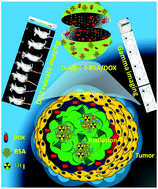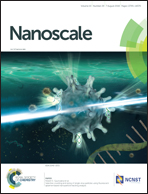Development of a thermosensitive protein conjugated nanogel for enhanced radio-chemotherapy of cancer †
Abstract
Although chemo-radiotherapy has been widely applied in clinics for cancer treatment, current strategies still face many challenges including serious side-effects and drug resistance. Herein, we develop a chemically cross-linked poly-N,N′-dimethyl aminoethyl methacrylate (PDMAEMA) smart nanogel as an excellent thermosensitive nanocarrier to load both an anticancer drug, doxorubicin (DOX) and a radioisotope, 131I-labeled albumin, for enhanced chemo-radioisotope therapy. Such a PDMAEMA nanogel in the solution form at room temperature can be easily injected into a tumor, in which it would be transformed into a gel at body temperature. Sustained drug release occurs in the tumor owing to the pH sensitive switching activity of the nanogel. In addition, the in situ thermogelling behavior of PDMAEMA leads to the long-term retention of 131I-labeled albumin within the tumor. In vivo chemo-radiotherapy is then conducted, achieving excellent therapeutic efficacy due to the sustained drug release and 131I retention for a long time in the cancer lesions. Our newly developed strategy of using a thermosensitive polymer for enhancing chemo-radiotherapy may be considered as a promising platform for combined cancer therapy without inducing obvious side-effects compared to the traditional chemo or radiotherapy.

- This article is part of the themed collection: 2018 Nanoscale HOT Article Collection


 Please wait while we load your content...
Please wait while we load your content...